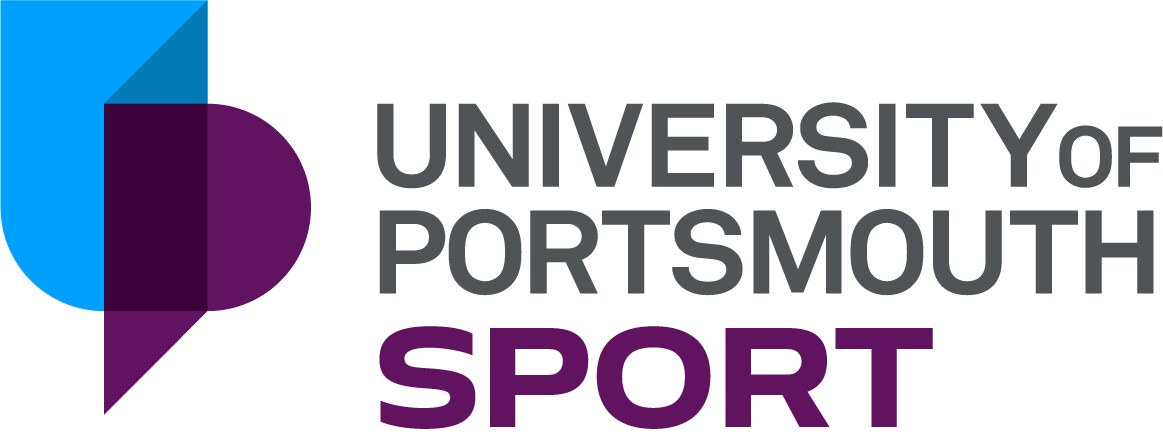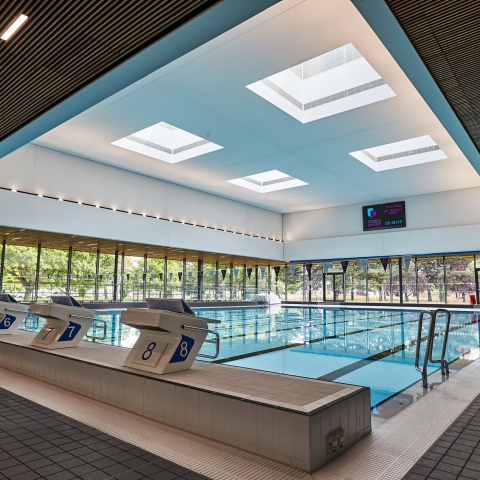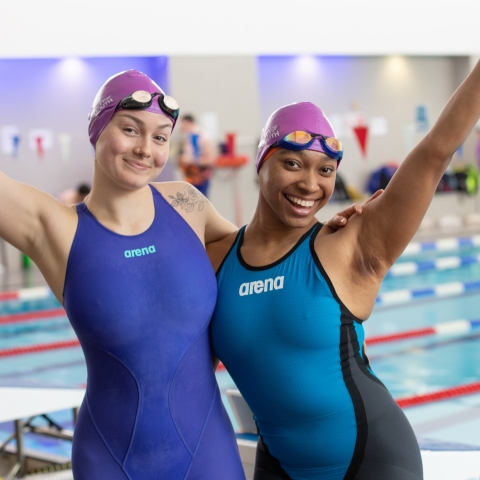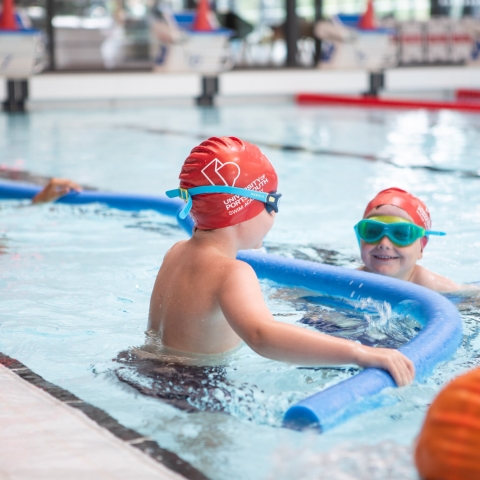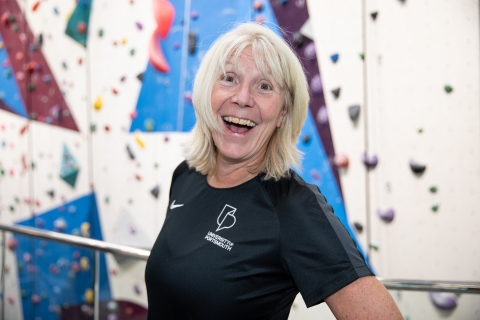

Discover the inspiring journey of Madeleine Campbell, Ravelin Sports Centre’s very own Olympic swimmer, as she shares her path from a local Portsmouth pool to competing on the world’s biggest stage.
With the Paris Olympics capturing global attention, some of you may be unaware that Ravelin Sports Centre boasts its own Olympic swimming talent. Madeleine Campbell (Senior Sports Development Officer - Swimming and Activities) is an accomplished swimmer whose journey to the Olympics is nothing short of inspiring. From her early days in Portsmouth to competing on the world stage, Madeleine's story is a testament to perseverance and dedication and she’s here to share her experiences and offer some great advice to future athletes.
Who is Madeleine Campbell?
My name is Madeleine Campbell, and I was born in Portsmouth. As the middle child among four brothers, I grew up naturally competitive. I explored various sports up until I was 11, including ballet, tap dance, gymnastics, athletics, and even chess. When my mum insisted I focus on just one sport, I chose swimming after winning a race. I began swimming regularly at 11, training 4 or 5 times a week. By the age of 13, I had my first international competition in Italy. It was both thrilling and intimidating, especially since I had never been out of the country or on a plane before. Ironically, my biggest fear at the time was being bitten by a dog with rabies, a concern fuelled by news stories about the disease at the time.
My inspiration really kicked in when a girl from my club made it to the 1976 Olympics. Seeing her achieve that made me think, "If she can do it, maybe I can too," and that’s when I first dreamed about competing in the Olympics.
What initially sparked your interest in swimming? Was there someone who inspired you to start your swimming career?
My interest in swimming initially came from my mum, who wanted us all to learn because she couldn’t swim herself. Her dad was a really good swimmer and played water polo for a club in Portsmouth called the North Sea Arms. So, she hired a small immersion pool for us, and all five of us siblings learned to swim there. Although everyone started swimming, I was the only one who stuck with it. By the time I was 11, I was doing pretty well. My inspiration really kicked in when a girl from my club made it to the 1976 Olympics. Seeing her achieve that made me think, "If she can do it, maybe I can too," and that’s when I first dreamed about competing in the Olympics.
What was your journey like to become an Olympic athlete for the Team GB?
My first Olympic trials were when I was 15, aiming for the 1980 Moscow Olympics. I was part of a special swim school with Sharon Davies, a well-known swimmer, whose father had set up the squad. The club was filled with international athletes, and I joined during the build-up to the Games. I started training in November, ahead of the Summer Olympics, and made it to the trials, reaching the final. Although I wasn’t in the top three, my best friend and Sharon were, and they went on to win silver medals in their events. Later, they were upgraded to gold when the original winners were disqualified for using performance-enhancing drugs.
Determined to make it to the Olympics, I continued swimming internationally in junior competitions. Before starting university, I faced a big decision: accept an American scholarship or stay in the UK. Despite receiving offers from American universities, I chose to stay and attended Loughborough, which had one of the top swim programs in the country. I didn’t want the pressure of having to swim for four years to maintain a scholarship and risk not completing my degree. I continued to swim, making it to the World Student Games and competing in my first senior international competition at the World Student Games in Edmonton, Canada. However, I took a break from swimming during my final year and a half of my studies, reducing my training significantly.
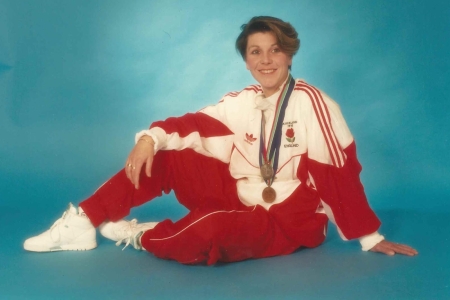
I was determined not to let that defeat define me. I continued to improve, placing fourth at the 1989 European Championships and winning silver and bronze at the 1990 Commonwealth Games. I broke a British record in 1990, holding it for a decade, and won the World Cup trophy in the butterfly category, earning top scores across various international events.
After graduating, I returned to Portsmouth and met a coach who encouraged me to start swimming again. At 22, I began swimming just three times a week, far less than the typical 8-10 sessions plus weight training that most swimmers did. Despite this, I made it to nationals, reached the finals, and finished second—my best-ever time, though it wasn’t enough to make the team. This success motivated me to train more seriously, and I began swimming 5-6 times a week. In 1987, I competed in the European Cup in Monaco and swam exceptionally well, prompting me to aim for the 1988 Olympics.
Although I initially missed out on the Olympic trials, finishing slower than needed, I was determined not to let that defeat define me. I continued to improve, placing fourth at the 1989 European Championships and winning silver and bronze at the 1990 Commonwealth Games. I broke a British record in 1990, holding it for a decade, and won the World Cup trophy in the butterfly category, earning top scores across various international events. I also served as team captain from 1990 through several European and World Championships.
Then, in 1992, I had my last chance to make the Olympics. I made the team, but my performance wasn’t what I had hoped for, and at 27, I decided it was time to retire.
What was your experience like at the Olympics?
It was an interesting time because the internet hadn’t fully taken off yet. We had something like email, where you could chat with others in the Olympic Village - a bit like an early version of Snapchat. You could send messages and connect with people, which was quite fascinating.
One of the highlights was all the freebies. Nowadays, you see athletes sharing their haul on Instagram, but even back then, we received a lot of free gear, though not as much as they do now. Life in the Olympic Village was challenging but memorable, but at least we didn’t have the cardboard beds they’ve talked about this year.
Talking about that, what’s your opinion of this year’s Olympics?
It's great that this year's Olympics focused on sustainability, but I’ve heard that the athletes struggled with sleep. Back when I competed in the Barcelona Olympics, we didn’t have air conditioning either, but our accommodation was near the Marina, which was beautiful and scenic. During the 1990 Commonwealth Games, we stayed in a small village of brand-new mobile homes.
The experience of living in the Olympic Village is always unique—everything is open 24/7 to accommodate athletes with early or late schedules, and the food is all free. There was a lot of fast food available, with sponsors like Domino's Pizza and Masterfoods offering snacks like M&M’s, Mars bars, and Diet Coke. While it was great that the food was free and always available, as an athlete, you need nutritious options to perform your best.
Pin swapping was a big tradition then, as it is now. We were given about 20 Team GB pin badges or shields to trade with others, a tradition that has been passed down for decades.
Do you remember any standout or unconventional athletes from the Olympics during your time?
We didn’t have social media back then, so sharing experiences was limited to the chat feature I mentioned earlier. I’m sure there was something memorable, but nothing specific comes to mind. However, a famous example is Eric the Eel from the 2000 Sydney Olympics. He was known as the slowest swimmer in Olympic history, qualifying through a wild card and finishing the 100-meter freestyle almost twice as slow as everyone else. Despite learning to swim just nine months before the competition and lacking proper training, his determination and the love he received from the crowd were incredible, raising the profile of his country—much like Eddie the Eagle did during the 1988 Winter Olympics in Calgary. I don’t recall a similar story from Barcelona, but I’m sure there were some.
What was the highlight of the Olympic experience for you?
The highlight of the Olympic experience for me was the opening ceremony, with around 200,000 people in the arena—it was truly incredible. Another memorable moment was watching the iconic outdoor diving competition from the top of the hill, where the view and atmosphere were just brilliant. Being in the stadium to witness Linford Christie win the gold medal in the 100m was amazing, and seeing our swimmers like Adrian Moorhouse perform so well in the pool added to the electric atmosphere.
Are there any common misconceptions people have about swimming at an elite level?
There are a few common misconceptions about swimming at an elite level. Some people think that because swimmers, especially females, tend to have broad shoulders and strong backs, we might be using performance-enhancing drugs. Another misconception is about the nature of training. While many assume it's all about endless laps in the pool, modern training, especially for sprinters, involves a lot of land-based strength and conditioning. It’s no longer necessary to be up at 4 am for pool training every day. Programs are becoming more child-friendly to prevent early burnout, which was a concern in the past. Sport England's long-term athlete development approach aims to keep young swimmers in the sport longer, allowing them to reach their peak in their twenties. So, while traditional training involved a lot of repetitive swimming, today’s methods incorporate more science and varied approaches.
Do you feel like the Olympic games or any of the competitions you've done helped you with your coaching career?
The Olympic Games and other competitions have definitely influenced my coaching career. I've always been driven to do my best, and swimming, while it has team elements, is largely an individual sport that requires a lot of self-motivation. I’ve carried that drive into managing swim programs, always striving to make them the best they can be. I’m focused on continuous improvement and open to ideas on how we can enhance the program.
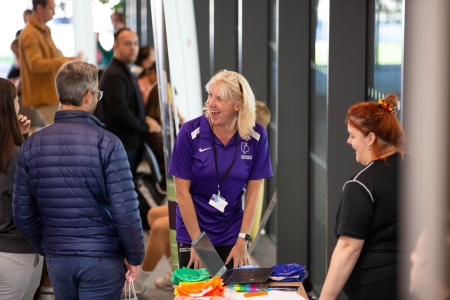
So what does your role as Senior Sports Development Officer here in Revelin Sports Centre entail?
I lead the organisation and delivery of swimming lessons at Ravelin Sports Centre. My role involves teaching the next generation of swimmers and ensuring we retain our participant numbers while maintaining a high-quality program. I oversee the delivery of lessons and make recommendations on how we can diversify and improve the program. When we started, we only offered stages 1 to 5, but now we go up to stage 10, and we've introduced pre-school lessons, adult classes, and 1-to-1 sessions. We're also looking to include rookie lifeguard training to help participants who might want to work with us in the future, especially local students who might be available when university students are away. While we'd love to start a squad, we work closely with the city’s swim club, transitioning our swimmers when they’re ready. My focus is on maintaining high standards and ensuring we continue to grow without compromising quality.
If you could change one thing about your swimming career or your coaching journey, what would it be?
If I could change one thing about my swimming career, it would be the 1988 trials where I missed out on going to Seoul. Although if I had gone, I might not have made it to Barcelona, so it's hard to say. Still, it would have been nice to have that experience. I believe a lot of success in swimming, and any sport really, comes down to mental attitude. When I was about 14 or 15, I struggled with a mental block after some twins beat me, and my mom even took me to a hypnotherapist to try to overcome it. But I didn’t believe in it, and it didn’t help. Looking back, I think more psychological support in my teens could have made a difference. We also didn’t have the best equipment or swimsuits back then, so I often wonder how much faster I could have been with today’s technology. I also regret not breaking the one-minute mark in the butterfly. I swam 60.2 seconds in a relay in Monaco and was gutted not to hit 59. That’s something I wish I could have achieved.
Believe that you can achieve your goals, as the only thing stopping you is yourself and your mental resilience.
What advice would you give to aspiring swimmers who dream of reaching the Olympic level?
For aspiring swimmers aiming for the Olympic level, my advice is to just go for it. Believe that you can achieve your goals, as the only thing stopping you is yourself and your mental resilience. It’s crucial to understand that reaching the top requires immense effort and dedication. For example, after missing out on the Olympics in 1988, I would come home every night and do 500 sit-ups, 500 squats, and 500 push-ups. Consistency and a strong mental attitude are key. A great example is Mark Tewksbury, a Canadian backstroker who missed the 1988 Olympics but won gold in Barcelona. He spent extra time with a synchro coach working on sculling and underwater fly kicks, which made the difference between silver and gold. Small additional efforts, like an extra kick or a slight improvement in technique, can be the margin between a gold medal and silver. The difference can be as small as 0.02 seconds, so every little bit counts.
If you could swim a race against any swimmer from history, who would it be and why?
If I could swim a race against any swimmer from history, I’d choose Michael Gross. He was a butterfly swimmer too and was very famous for his impressive arm span, so it would have been fascinating to race against him. I’d also love to race against Adrian Moorhouse, known for his breaststroke. A head-to-head match with me in the butterfly and him in the breaststroke would be interesting. I also think mixed-gender relays are fantastic, and it would have been great to compete in a mixed medley relay, going head-to-head with other top swimmers in that format.
Start your Swimming Journey Today
Do you or your kids want to become a professional swimmer, learn how to swim or just swim for fun? Check out all the options below and jump in the pool!

